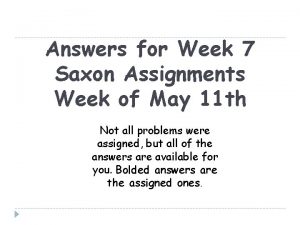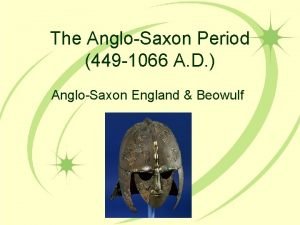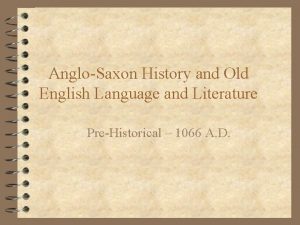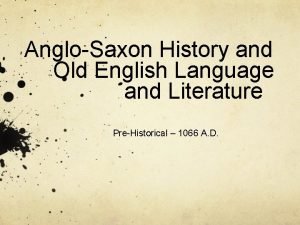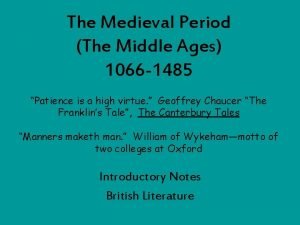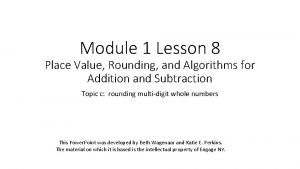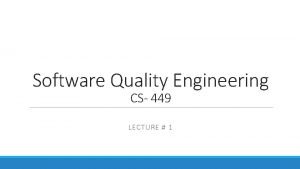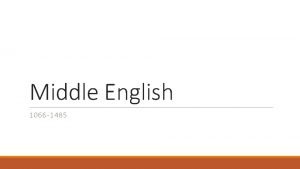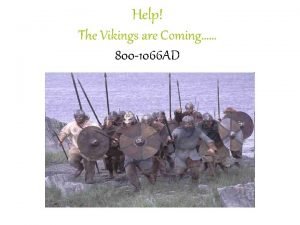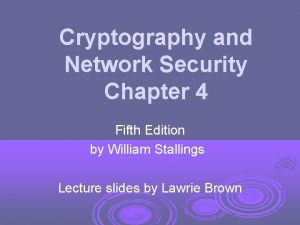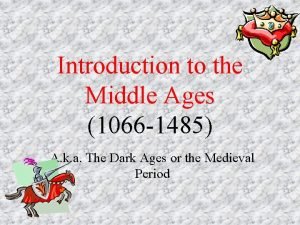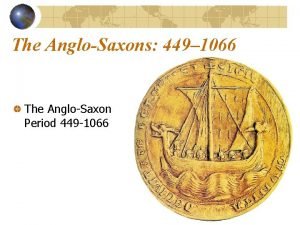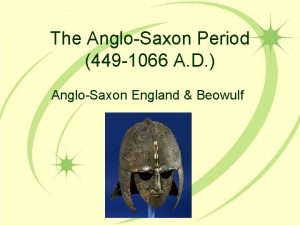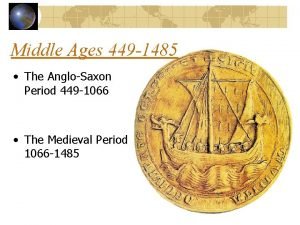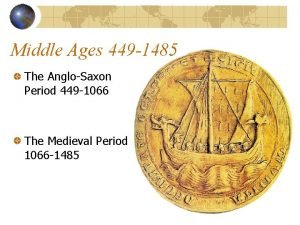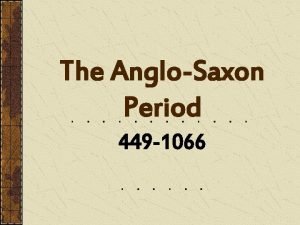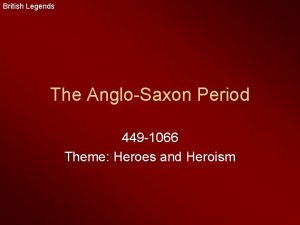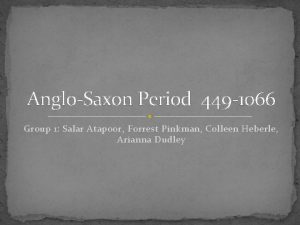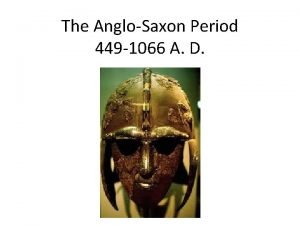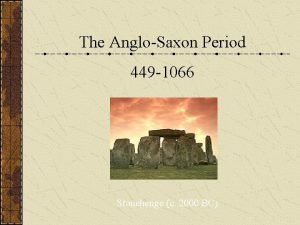AngloSaxon Period 449 1066 Overview of Periods of



















- Slides: 19

Anglo-Saxon Period (449 -1066)

Overview of Periods of Early English History Pre-History— 1066 A. D. 1. 2. 3. 4. 5. Pre-Roman/Pre-Historical up to 55 B. C. Roman Occupation 55 B. C. – 410 A. D. Anglo-Saxon Period 410 – 787 A. D. Viking Invasions 787 – 1066 A. D. Norman Conquest begins in 1066. Retrieved from: http: //www. saintursula. org/library/projects/Martin. Reading. Assignments/Anglo. Saxon%20&%20 Old%20 English%20 History%20 and%20 Literature%201. pps

Pre-Historical / Pre-Roman n The island we know as England was occupied by a race of people called the Celts. One of the tribes was called the Brythons or Britons (where we get the term Britain). The other tribe was called the Gaels, who settled in Ireland. The Celts were Pagans and their religion was know as “animism, ” a Latin word for “spirit. ” Celts saw spirits everywhere. Druids were their priests; their role was to act as mediums between the gods and the people. Retrieved from: http: //www. saintursula. org/library/projects/Martin. Reading. Assignments/Anglo. Saxon%20&%20 Old%20 English%20 History%20 and%20 Literature%201. pps

Roman Occupation Hadrian’s Wall Retrieved from: http: //www. saintursula. org/library/projects/Martin. Reading. Assignments/Anglo. Saxon%20&%20 Old%20 English%20 History%20 and%20 Literature%201. pps

Important Events During Roman Occupation n n Julius Caesar begins invasion/occupation in 55 B. C. Occupation completed by Claudius in 1 st cent. A. D. Hadrian’s Wall built about 122 A. D. Romans “leave” in 410 A. D. because Visigoths attack Rome St. Augustine lands in Kent in 597 and converts King Ethelbert (king of Kent, the oldest Saxon settlement) to Christianity; becomes first Archbishop of Canterbury Retrieved from: http: //www. saintursula. org/library/projects/Martin. Reading. Assignments/Anglo. Saxon%20&%20 Old%20 English%20 History%20 and%20 Literature%201. pps

Important Cultural and Historical Results of the Roman Occupation n Military—strong armed forces (“legions”) – – Pushed Celts into Wales and Ireland Prevented Vikings from raiding for several hundred years n Infrastructure n Language and Writing n Religion – Government (fell apart when they left) – Walls, villas, roads, public baths (some remains still exist) – Latin was official language – Practice of recording history led to earliest English “literature” being documentary – Christianity beginning to take hold, especially after St. Augustine converts King Ethelbert Retrieved from: http: //www. saintursula. org/library/projects/Martin. Reading. Assignments/Anglo. Saxon%20&%20 Old%20 English%20 History%20 and%20 Literature%201. pps

The Anglo-Saxons Retrieved from: http: //www. saintursula. org/library/projects/Martin. Reading. Assignments/Anglo. Saxon%20&%20 Old%20 English%20 History%20 and%20 Literature%201. pps

Important Events in the Anglo-Saxon Period n n 410 - 450: Angles and Saxons invade from Baltic shores of Germany, and the Jutes invade from the Jutland peninsula in Denmark – The Geats are a tribe from Jutland Britons fought back, but were overwhelmed. – Semi-legendary King Arthur comes from this era. Retrieved from: http: //www. saintursula. org/library/projects/Martin. Reading. Assignments/Anglo. Saxon%20&%20 Old%20 English%20 History%20 and%20 Literature%201. pps

Anglo-Saxon Heptarchy = Seven Kingdoms 1. Kent 2. Essex (East Saxon) 3. Sussex (South Saxon) 4. East Anglia 5. Northumbria 6. Mercia 7. Wessex (West Saxon) Retrieved from: http: //www. saintursula. org/library/projects/Martin. Reading. Assignments/Anglo. Saxon%20&%20 Old%20 English%20 History%20 and%20 Literature%201. pps

Anglo-Saxon Social Structure King = Ring-giver Thanes Serfs and Slaves

Anglo-Saxon Religion n Wyrd—”fate controls all” – Contrasts with the Christian idea of free will n Anglo-Saxons believed in the Norse gods. – Tiu, Woden, Thor, Fria n Eventually, missionaries introduced Christianity to kings and converted them. – When a king converted to Christianity, all of his followers were bound to convert as well. – A stronger sense of control over fate developed. n As a result, pagan and Christian elements became mixed in the literature of the time.

Danish/Viking Invasions 787 -1066 Retrieved from: http: //www. saintursula. org/library/projects/Martin. Reading. Assignments/Anglo. Saxon%20&%20 Old%20 English%20 History%20 and%20 Literature%201. pps

Vikings n n n By definition, Vikings were sea-faring (explorers, traders, and warriors) Scandinavians during the 8 th through 11 th centuries. Oddly enough, the Anglo-Saxon (and Jute) heritage was not much different from the Vikings’: they, too, were Scandinavian invaders. In fact, some Vikings were also called “Northmen” which is related to yet another culture (this one French) which made conquest of England—the Normans, and William the Conqueror in 1066. However, when the Viking raids began around 787, the Anglo-Saxons were different culturally from the Viking invaders. Retrieved from: http: //www. saintursula. org/library/projects/Martin. Reading. Assignments/Anglo. Saxon%20&%20 Old%20 English%20 History%20 and%20 Literature%201. pps

Alfred the Great n n n Saxon king of Wessex who was able to withstand the Danish onslaught. Only English king to be called “the Great” Encouraged learning and education – Translated literature into the vernacular, which fostered the growth of the English language – Opened public schools – Started the Anglo-Saxon Chronicle, which kept records of the age

Important Results of the Viking Invasions n n Politically and Culturally – Continued political instability and conflict (i. e. , tribal war): there was no central government or church. – The Anglo-Saxon code (more on this when we read Beowulf) Linguistically (The English Language at its Earliest) – The English language is “born” during the first millennium and is known as Old English (OE). Anglo-Saxon is the term for the culture. – Old English is mainly Germanic in grammar and lexicon (words) the core of our modern English is vastly influenced by this early linguistic “DNA”. Retrieved from: http: //www. saintursula. org/library/projects/Martin. Reading. Assignments/Anglo. Saxon%20&%20 Old%20 English%20 History%20 and%20 Literature%201. pps

Huh? (we better boil those important results down!) n n n Lots of ongoing tribal feuds and wars led to. . . Lots of intermingling of similar but different Germanic languages. . . interrupted by. . . MORE Viking invasions, which gave way to. . . Some political unification (Alfred). . . Which led to. . . OLD ENGLISH, the earliest form of our language!!

Early England Created by Three Invasions 2. Anglo-Saxon 1. Roman Occupation 55 B. C. -410 A. D. and Viking Invasions 410 – 1066 A. D. GERMAN(IC) LATIN 3. The Norman Invasion (The Battle of Hastings) in 1066 A. D. FRENCH

Norman Invasion In 1066 at the Battle of Hastings, the Normans (powerful Northern Frenchmen) defeated the English and started a centuries-long conquest of England n Two Most Important Effects: n – French becomes official language of politics and power and exerts enormous influence on Old English – England begins unifying under a French political system, much of which is still with us (even in the U. S. ) today

The Anglo-Saxon Period in Review n Pre-Anglo-Saxon (really “pre” historical) – Celtic Peoples (approx 1700/400 B. C. – 55 B. C. ) – Roman Occupation (55 B. C. -410 A. D. ) n Anglo-Saxon/Viking – Angles, Saxons, Frisian, and Jutes (410 -787) – Viking Raids/Invasions begin 8 th c. and end 10 th c. n Norman Invasion/Occupation (really in the Middle Ages) – Battle of Hastings in 1066, then about four centuries of French rule
 The anglo-saxon period 449 to 1066 answers
The anglo-saxon period 449 to 1066 answers Anglo saxon period
Anglo saxon period How old is english language
How old is english language Anglosaxon history
Anglosaxon history Middle english period 1066-1500
Middle english period 1066-1500 Old english period
Old english period Rounding money chapter 1 lesson 8
Rounding money chapter 1 lesson 8 Davies v waldron
Davies v waldron 499-449
499-449 Cs 449
Cs 449 Cs 449
Cs 449 Cpsc 449
Cpsc 449 Jhlt. 2019 oct; 38(10): 1015-1066
Jhlt. 2019 oct; 38(10): 1015-1066 The middle ages 1066 to 1485 unit introduction
The middle ages 1066 to 1485 unit introduction 14th october 1066
14th october 1066 The vikings 800 to 1066
The vikings 800 to 1066 Jhlt. 2019 oct; 38(10): 1015-1066
Jhlt. 2019 oct; 38(10): 1015-1066 Gcd(1970,1066)
Gcd(1970,1066) The middle ages 1066 to 1485 unit test closed book
The middle ages 1066 to 1485 unit test closed book The 1066 word search answers
The 1066 word search answers
